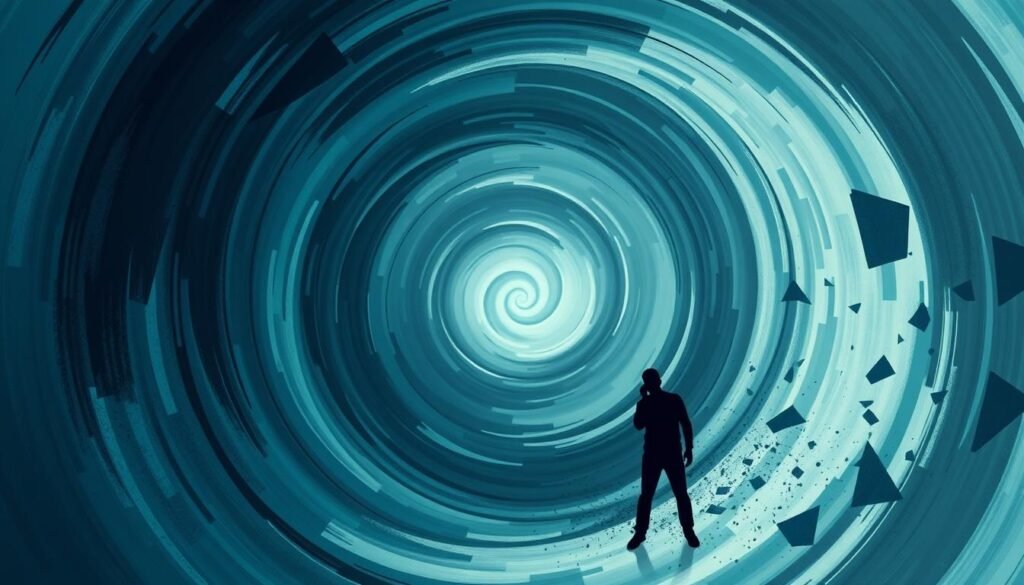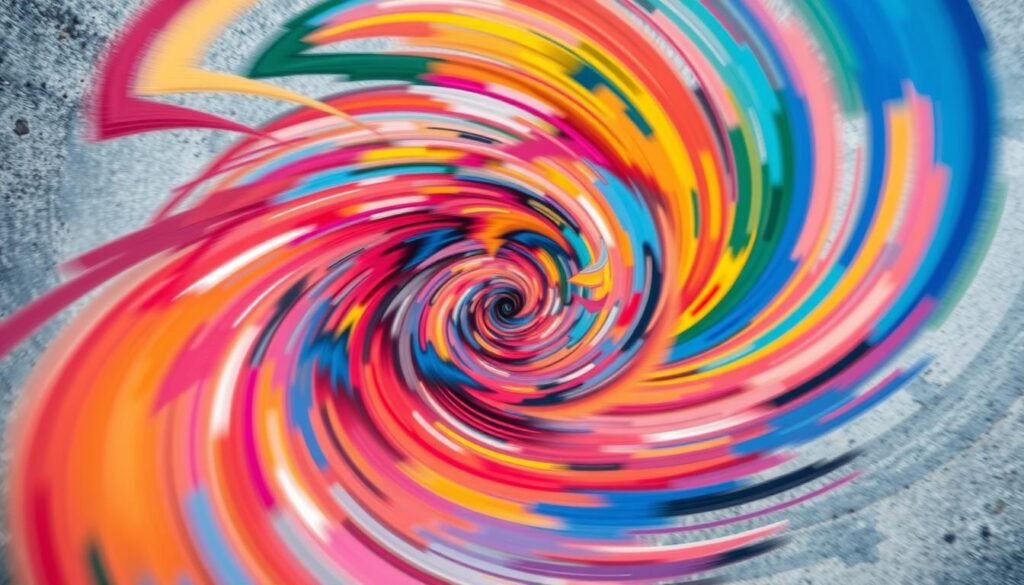About 40 million adults in the U.S. suffer from anxiety disorders. This condition can lead to unexpected dizziness. This dizziness is not just stress-related but a serious issue that needs attention.
During high-stress moments, people may feel very dizzy. This can make their anxiety and disorientation worse. It’s important to understand the link between anxiety and dizziness. This knowledge can help those affected and healthcare professionals.
Key Takeaways
- Anxiety can lead to dizziness, especially during high-stress episodes.
- Dizziness may stem from physiological responses during anxiety attacks.
- Managing symptoms might involve techniques like the 4-7-8 breathing method.
- Vestibular rehabilitation can help improve balance and alleviate dizziness issues.
- Seeking professional help is advisable when dizziness interferes with daily life.
- Combining treatments can effectively manage both dizziness and anxiety symptoms.
Introduction to Anxiety and Dizziness
Anxiety and dizziness often go hand in hand for many people. Studies have found a link between anxiety and dizziness. Those with anxiety might notice they feel dizzy during moments of worry or fear.
Seeking help for dizziness is common, and it’s a double challenge when you have anxiety. Anxiety can cause dizziness, but so can other health issues. Conditions like BPPV, vestibular neuritis, and migraines are also culprits. Knowing the different causes helps in managing anxiety and dizziness better.
There are various treatments for dizziness, depending on its root cause. If you often feel dizzy without knowing why, seeing a doctor is a good step. For more on anxiety disorders, check out self-tests like the one found here.
To handle anxiety symptoms, try relaxation methods or medication. Understanding anxiety and dizziness well helps improve your mental health. Keeping an eye on your symptoms can make a big difference in how you feel.
Understanding Anxiety Disorders
Anxiety disorders deeply affect many people. They cause both mental and physical health issues. Research shows around 20% of adults are affected by an anxiety disorder. Women are slightly more affected with rates around 23%. These numbers highlight why it’s crucial to recognize symptoms and get the right treatment.
Statistics on Anxiety Disorders
About 10-15% of patients seeking medical help for dizziness might have a psychiatric disorder. Interestingly, nearly 60% of those with chronic dizziness also suffer from an anxiety disorder. This shows a clear link between anxiety and dizziness.
Common Symptoms of Anxiety Disorders
Individuals with anxiety disorders report various symptoms. Some common ones include:
- Rapid heartbeat
- Restlessness
- Feelings of panic
- Dizziness or lightheadedness
- Difficulty concentrating
- A constant sense of impending doom
Dizziness is a major issue for those with anxiety, leading to more anxiety about the dizziness itself. Effective treatments often combine psychology, cognitive-behavioral therapy, and physical therapy. They especially target the vestibular system to tackle dizziness caused by anxiety.
What is Dizziness?
Dizziness encompasses feelings like lightheadedness, vertigo, and imbalance. It can make people feel disoriented or unsteady. Lightheadedness feels like you’re about to faint, while vertigo feels like spinning. Knowing these differences helps identify dizziness symptoms, including those from anxiety.
Dizziness can stem from many issues, including inner ear problems, brain disorders, or anxiety. Sometimes dizziness is not serious, but if it’s often or severe, it can affect daily life.
Common dizziness causes include:
- Migraine episodes: 30–50% of people with migraines may feel dizzy.
- Inner ear conditions: Diseases like Ménière’s disease can cause vertigo, ear ringing, and hearing loss.
- Motion sickness: Repetitive movement, like in cars, can lead to dizziness and feeling sick.
- Iron deficiency anemia: Symptoms can include dizziness, being out of breath, and feeling tired.
- Anxiety attacks: They often cause dizziness, worry, and trouble focusing.
Dizziness is often reported by adults seeking healthcare. It’s important to connect dizziness to anxiety disorders. Anxiety impacts over 18% of the U.S. population, linking many cases of dizziness to anxiety. Understanding dizziness types and causes helps in managing it.
| Type of Dizziness | Description | Common Causes |
|---|---|---|
| Lightheadedness | A feeling of faintness or near-syncope. | Anemia, dehydration, anxiety attacks. |
| Vertigo | A false sensation of spinning. | Migraine, vestibular disorders, Ménière’s disease. |
| Imbalance | Difficulty maintaining stability. | Certain medications, inner ear issues, neurological conditions. |
Understanding dizziness better helps those affected find relief and improve their life quality.
Can Anxiety Make You Dizzy?
Anxiety can indeed make you feel dizzy. This is due to the bodily changes that come with anxiety. Especially when you breathe too fast or feel an adrenaline rush. These changes can make the feelings of dizziness even stronger.
How Dizziness Relates to Anxiety
When anxious, dizziness can come on suddenly and vary in intensity. It often happens during panic attacks from breathing too quickly. This lowers the amount of carbon dioxide in your blood, causing you to feel light-headed or faint.
The link between anxiety and dizziness feeds into each other, creating a loop. As anxiety gets worse, so can the dizziness. This increases fear and anxiety. Slowing down your breathing, drinking water, or focusing on something steady can help break this cycle.
The Role of the Vestibular System
Your balance and knowing where you are in space come from the vestibular system. Anxiety can mess with this system by kicking off the body’s fight-or-flight response. This stresses the vestibular system and makes the anxiety-dizziness connection even stronger.
If you’re dealing with these issues, it’s a good idea to get help. Therapy, like cognitive-behavioral therapy, can be really useful. It helps to know more about the vestibular system too, sometimes by visiting places like the National Dizzy & Balance Center. This knowledge can make it easier to deal with anxiety and dizziness.

The Fight or Flight Response Explained
The body’s fight or flight response is its way of handling danger. It releases hormones like adrenaline and cortisol. This can make you feel dizzy as your heart beats faster and you breathe quickly.
In stressful times, like during a job interview, your anxiety may increase. In the U.S., nearly 20% of people will face an anxiety disorder. These moments often bring on feelings of dizziness, linking the condition to the stress we feel.
After stress hits, it can take up to an hour for your body to calm down. But if you’re always stressed, you might feel dizzy often. People with anxiety disorders can struggle more with symptoms like vertigo.
Finding ways to deal with anxiety is key. Treatments like cognitive-behavioral therapy and medication help. Exercise and strong friendships also make a big difference in handling anxiety.
| Hormonal Effects | Physical Symptoms |
|---|---|
| Adrenaline | Increased heart rate |
| Cortisol | Rapid breathing |
| Adrenaline and Cortisol | Dizziness, light-headedness, vertigo |
Understanding the link between feelings and body reactions helps in managing anxiety. Knowing this helps us act early to lessen anxiety-triggered dizziness.
Other Symptoms Associated with Anxiety
Anxiety affects us in many ways, touching both our body and mind. People with anxiety often face a range of problems. It’s vital to know these issues to better handle anxiety, including the troubling feeling of dizziness.
Physical and Psychological Symptoms
The physical symptoms common in anxiety include:
- Rapid heartbeat
- Trembling or shaking
- Breathlessness
- Sweating
- Dizziness
- Fatigue and muscle tension
- Nausea
These symptoms can make the dizziness worse, adding to the anxiety challenge. Meanwhile, psychological symptoms consist of:
- Persistent worry and fear
- Feelings of dread or panic
- Difficulty concentrating
- Excessive self-consciousness in social situations
- Intrusive thoughts or compulsions
By understanding everything from dizziness to unwanted thoughts, we can more actively seek help. Knowing about anxiety disorders is crucial. They show us the complex nature of anxiety.
For further details on anxiety’s physical symptoms, check out this useful link.

Dizziness Related to Inner Ear Disorders
Dizziness can be a big problem, especially when it comes from the inner ear. These issues do more than mess with your balance. They can make you feel lightheaded or give you vertigo. Knowing how inner ear problems and dizziness are linked helps in handling them better.
Common Inner Ear Disorders
There are a few inner ear problems often tied to dizziness, such as:
- Benign Paroxysmal Positional Vertigo (BPPV): This includes short spells of vertigo caused by moving your head.
- Meniere’s Disease: Shows up as dizziness, hearing loss, and ringing ears due to fluid in the inner ear.
- Vestibular Neuritis: This is from the vestibular nerve getting inflamed, leading to sudden dizziness and trouble with balance.
The Connection Between Inner Ear Disorders and Anxiety
Inner ear problems can also lead to feeling anxious because of constant dizziness. This long-lasting dizziness increases anxiety, making a cycle where anxiety makes the dizziness worse. Anxiety fires up the stress response in the body during these times.
Feeling dizzy from anxiety might make you lightheaded, nauseous, and hard to focus. Handling it long-term often means dealing with the anxiety to lessen the dizziness. Deep breathing helps fight off hyperventilation that makes the dizziness stronger.
Those dealing with these ear conditions might find relief through special treatments. Vestibular rehabilitation therapy and changing certain habits help a lot. Not only does this improve dizziness, but it can also reduce anxiety, making life better overall.
Managing Anxiety Dizziness
Many people find managing anxiety dizziness tough. The cycle of dizziness and anxiety affecting each other makes daily life hard. Getting professional help and using self-help methods can really help in handling dizziness caused by anxiety.
Benefits of Professional Treatment
It’s important to seek help from experts like headache specialists or neurologists who know about vestibular disorders. They offer valuable tools for dealing with anxiety and dizziness. This addresses both the body and mind symptoms.
Options like cognitive behavioral therapy (CBT) can break the cycle of dizziness and anxiety. It helps people understand their feelings and find good ways to cope. Getting professional support encourages growth and progress in overcoming these challenges.
Self-Management Techniques
Using self-help strategies along with professional advice is key. These methods give people a way to control their symptoms every day. Some good self-management techniques are:
- Breathing exercises to help relax and lower anxiety.
- Grounding techniques like the 5-4-3-2-1 method to stay steady when dizzy.
- Mindfulness practices such as EFT Tapping to keep your mind off bad feelings.
- Regular physical activities to cut down on stress and boost health.
- Maintaining good sleep hygiene, staying hydrated, and eating right to keep the body strong.
It’s about making these practices a part of your daily life. This leads to better coping skills and the strength to deal with challenges. Building a supportive community is crucial for those dealing with anxiety and dizziness.
Lifestyle Changes to Reduce Anxiety and Dizziness
Adopting healthy lifestyle changes can ease anxiety and dizziness. By forming healthier habits, you can improve your mental health. This section focuses on key changes like relaxation methods and smart eating. These steps not only manage anxiety but also boost overall health.
Practicing Relaxation Techniques
Adding relaxation techniques to your day can lower anxiety and reduce dizziness. Beneficial practices include:
- Meditation: A few minutes of focused breathing can bring calmness.
- Yoga: Combining movement and mindfulness reduces tension.
- Deep Breathing Exercises: Slow, deep breaths help stabilize feelings during anxious moments.
By making these techniques part of your routine, you might see less anxiety-related dizziness. This can bring you stability and peace.
The Importance of a Healthy Diet
Choosing the right foods is key for managing anxiety. Eating nutrient-rich foods supports brain health and calms anxiety. Important foods to include are:
- Omega-3 Fatty Acids: Available in fish like salmon, they improve mood.
- Whole Grains: These keep blood sugar levels stable.
- Fruits and Vegetables: They are full of vitamins and antioxidants.
It’s also crucial to drink plenty of water to avoid dizziness. Understanding the connection between diet and mental wellness can help you tackle anxiety with lifestyle changes.
When to Seek Professional Help
It’s important to know when to seek help for anxiety symptoms like dizziness. If dizziness disrupts daily life, it’s time to pay attention. This isn’t just about stress; ongoing dizziness makes anxiety worse, creating a hard-to-break cycle.
Inner ear issues, migraines, and vestibular neuronitis might cause dizziness. These should be checked by doctors. Feeling lightheaded, shaky, or disconnected are common with anxiety-related dizziness. These feelings can last a few seconds or several hours.
If severe dizziness causes balance problems or falls, get medical help fast. Doctors can find out what’s causing the dizziness. Understanding the cause can lead to better handling of anxiety dizziness, thus improving life quality. For tips on managing stress and its effects, visit this resource.
People dealing with anxiety and dizziness might get help from specific treatments. Knowing the link between stress, anxiety, and vertigo is key. Routine check-ups with health professionals help tweak treatments for better health.

Understanding the Reciprocal Relationship
Anxiety and dizziness often feed into each other, making both worse. This creates a tough cycle to escape from. When someone feels dizzy due to anxiety, this physical feeling can make their anxious thoughts worse. It turns into a loop that’s hard to break.
Dizziness from anxiety happens when someone hyperventilates during a panic attack. This can make them feel lightheaded or unstable. On the flip side, constant dizziness can make a person more anxious. They might worry that their dizziness is a sign of a serious health problem.
Understanding how anxiety and dizziness are connected shows why it’s key to manage both. Treatments like cognitive behavioral therapy and medications such as SSRIs can be effective. They help lessen anxiety-driven dizziness, improving life quality.
The following table illustrates key insights into the reciprocal relationship between anxiety and dizziness:
| Aspect | Anxiety Impact | Dizziness Impact |
|---|---|---|
| Symptoms | Rapid heartbeat, hyperventilation | Lightheadedness, unsteadiness |
| Behavioral Responses | Avoidant and escape behaviors | Increased anxiety about dizziness |
| Treatment Options | Cognitive behavioral therapy, SSRIs | Addressing underlying anxiety disorders |
| Statistical Findings | 15% of dizzy patients have anxiety disorders | Chronic subjective dizziness linked to anxiety disorders |
Understanding the link between anxiety and dizziness is key for finding good coping methods. By dealing with one, you might find relief in the other. This can lead to a more stable, healthy life.
Conclusion
Knowing how anxiety links to dizziness helps those affected find the right help. The fact is, anxiety can indeed lead to dizziness. Research shows that more than 18% of U.S. adults suffer from anxiety. This affects their life deeply.
People with dizziness anxiety disorder face both mental and physical hurdles. It’s important to treat both sides for better health. Stress can increase cortisol levels, making dizziness worse. Studies show that those with anxiety are more likely to have vertigo. This shows why both anxiety and physical health need attention.
Using strong coping skills is key. These can range from cognitive behavioral therapy to relaxation practices. Understanding the link between anxiety and dizziness encourages people to get support. This helps improve their overall health.